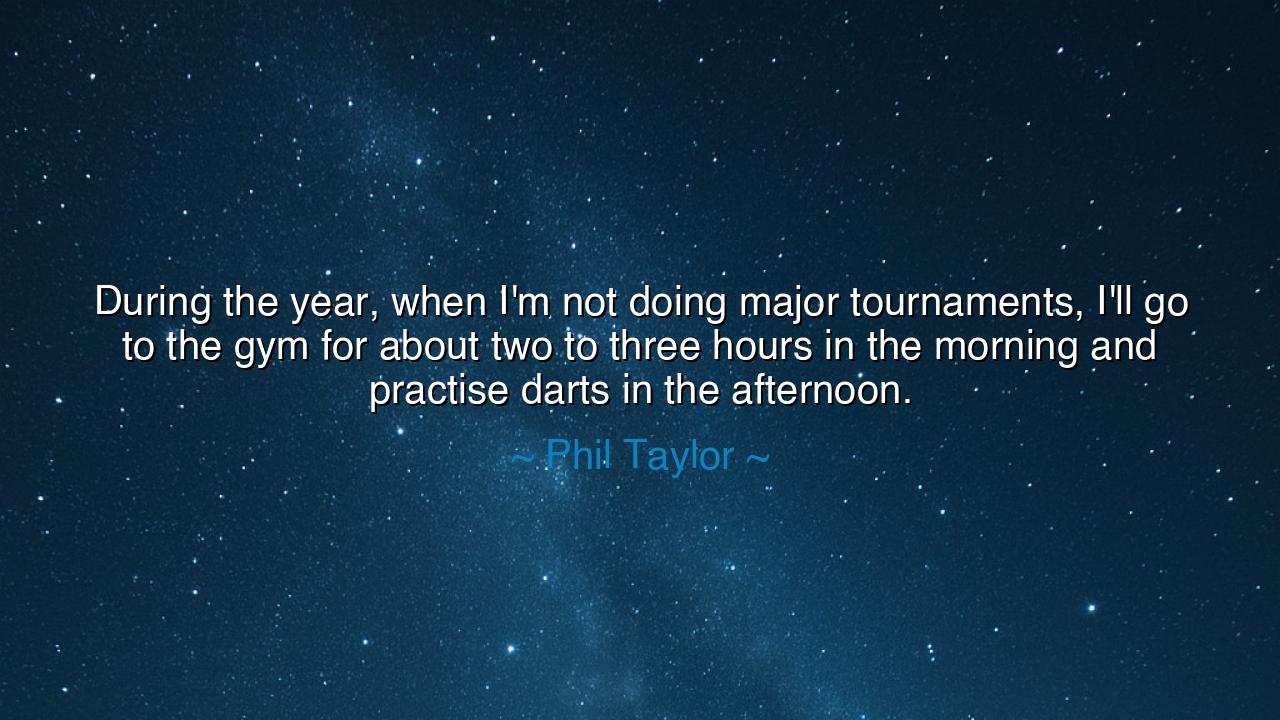
During the year, when I'm not doing major tournaments, I'll go
During the year, when I'm not doing major tournaments, I'll go to the gym for about two to three hours in the morning and practise darts in the afternoon.






“During the year, when I’m not doing major tournaments, I’ll go to the gym for about two to three hours in the morning and practise darts in the afternoon.” Thus spoke Phil Taylor, the great master of darts, a man whose steady hand and unwavering focus made him a legend of his sport. At first glance, his words seem simple, describing nothing more than a daily routine. Yet within them lies a truth of the ancients: that greatness is not born in the moment of contest, but in the unseen hours of discipline, when the crowd is silent and the work is done in solitude.
The origin of this saying rests in Taylor’s life as a champion who understood that success is not forged in brilliance alone, but in preparation. He speaks of the gym in the morning, where the body is strengthened, and of darts in the afternoon, where the craft is honed. This is the rhythm of a life dedicated to mastery—the balance of physical endurance and mental precision. It is a reminder that even in a game played with the smallest of movements, the body and spirit must be trained as carefully as in any heroic endeavor.
The ancients knew this same pattern. The Greek athlete, training for the Olympic games, would rise early to strengthen the body with running, wrestling, or discus before practicing the finer arts of skill. The philosopher, too, first disciplined the body and appetite before turning the mind to reason. For they knew that excellence is harmony—the union of strength and precision, will and patience. Phil Taylor’s daily ritual, though modern in its setting, is nothing less than an echo of this ancient wisdom.
History gives us countless examples. Consider Miyamoto Musashi, the famed Japanese swordsman, who practiced with relentless discipline, wielding his blade thousands of times each day until even the smallest movement became instinct. His victories in battle were not won on the field, but in the lonely hours of practice where no one watched. So too Taylor: the trophies he lifted before great crowds were but the fruit of mornings in the gym and afternoons before the dartboard. The contest is merely the harvest; the training is the sowing.
From this we learn that the life of mastery is built not on moments of glory, but on the long and quiet labor of preparation. To train for hours when there is no tournament, to strengthen the body when there is no immediate test, to practice skill when no applause is offered—this is the way of those who endure. Taylor’s words remind us that champions are not made on the stage, but in the hidden days when they choose discipline over comfort.
Practical wisdom follows: each of us must find our own “gym” and our own “practice.” It may not be weights and darts, but it is the labor of strengthening ourselves and honing our craft. Perhaps it is study in the morning and creative work in the afternoon, or exercise followed by building a skill. The structure does not matter; what matters is the discipline of balance, the daily devotion that prepares us for whatever trials await. If we seek greatness, we must build it hour by hour, day by day.
Thus, remember the words of Phil Taylor: “Two to three hours in the morning, practice in the afternoon.” They are not merely the routine of a darts player, but a map for the pursuit of excellence in any field. They teach us that consistency is the bedrock of greatness, that strength and skill must be cultivated with patience, and that the truest victories are won long before the battle is fought. Honor your mornings, dedicate your afternoons, and in time, you too shall find that the world calls you master.






AAdministratorAdministrator
Welcome, honored guests. Please leave a comment, we will respond soon